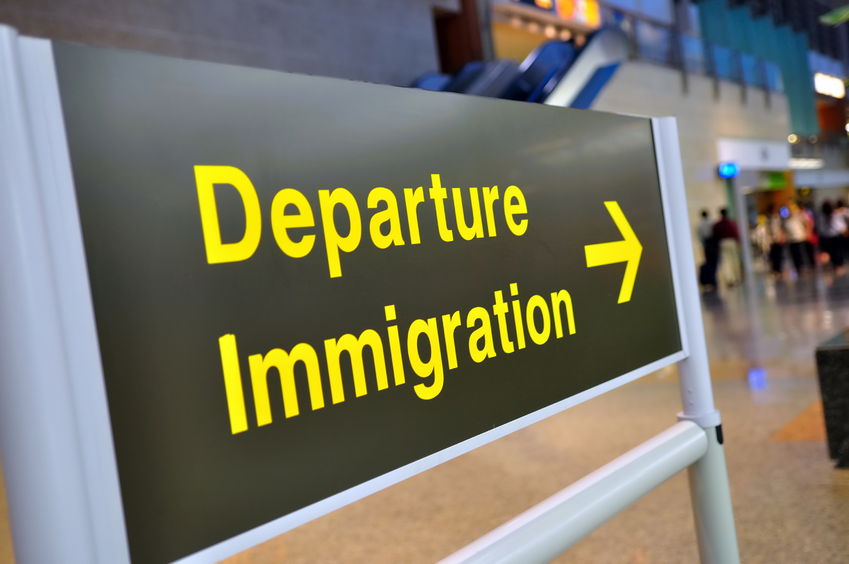The Supreme Court lifted parts of the injunction against the Trump administration’s travel ban on Monday, pending oral argument and a full decision.
The Court, however, explicitly ruled that the injunction remains in place — the administration cannot enforce its ban — against “foreign nationals who have a credible claim of a bona fide relationship with a person or entity in the United States.”
As Ilya Somin points out, the administration is blatantly defying the Court’s ruling.

Copyright: prestonia / 123RF Stock Photo
They’ve decided to define ‘bona fide relatoinship’ as excluding “grandparents, grandchildren, aunts, uncles, nieces, nephews, cousins, brothers-laws and sisters-in-law, fiancés, and any other ‘extended’ family members” of residents of the United States.”
The Court lifted the injunction against “foreign nationals abroad who have no connection to the United States at all” and the Trump administration has decided to act as though grandparents and in-laws have no connection at all (although they apparently reversed course on their claim that fiances have no connection).
The Supreme Court explicitly gave the example of a mother-in-law as having a “close family relationship” so the administration isn’t trying to ban mothers-in-law.
Moreover, while refugees cannot be banned if they have a formal relationship with a U.S. organization (e.g. “offer of employment, acceptance to an academic program at a university, an invitation to give a lecture”) yet the administration is banning entry to refugees “who have received ‘formal assurances’ from US refugee resettlement organizations who have agreed to sponsor them.”

Copyright: andreyuu / 123RF Stock Photo
The State of Hawaii, one of the original plaintiffs against the ban whose challenge was upheld, is suing.
“A few hours ago, after days of stonewalling plaintiffs’ repeated requests for information, the government announced that it intended to violate the Supreme Court’s instruction,” Hawaii said in a filing Thursday in Honolulu federal court. “It will apply the executive order to exclude a host of aliens with a ‘close familial relationship” to U.S. persons, including grandparents and grandchildren, brothers- and sisters-in-law, fiancés, aunts, uncles, nieces, nephews and cousins.”


JC read your own quotes, they support exactly what I said, the case was remanded to the District Court to do exactly what Hawaii was asking which is interpret the Court’s ruling as-applied by the administration.
@Gary — Yes, but you forget the pesky little issue of your gratuitous lies about ruling the District Court judge erred.
Please clarify whether you have just overall started lying to defend your hare-brained theories or it’s a reading issue for you.
@JC the district judge erred or the 9th Circuit wouldn’t be remanding the case, Q.E.D.
@Gary Hmmm … are you now going to update your profile to include your extraordinary skills in ESP?
Again, ask your Literacy Volunteer to show you precisely where in the Circuit Court opinion it states or even implies the District Court erred. Quite the contrary, a careful and skilled (or honest???) reader would see where the Circuit Court stated that the District Court made the correct call.
Seriously, Gary, if you need to lie about these things how can we be sure you don’t also lie about your travel advice?
No ESP needed. After the case was sent back for re-evaluation with a determination that it is indeed their role to interpret whether the administration is complying with the Supreme Court’s ruling, that’s exactly what the court did.
https://www.washingtonpost.com/news/morning-mix/wp/2017/07/14/judge-in-hawaii-rules-grandparents-are-exempt-from-trump-travel-ban/?utm_term=.5562e8bd48f7
“U.S. District Judge Derrick Watson ruled Thursday night that the federal government’s list of family relatives eligible to bypass the travel ban should be expanded to include grandparents, grandchildren, uncles, aunts and other relatives. Watson also ordered exemptions for refugees who have been given formal assurance from agencies placing them in the United States.
In Watson’s ruling, he said the government’s definition of what constitutes close family “represents the antithesis of common sense.”
“Common sense, for instance, dictates that close family members be defined to include grandparents,” Watson wrote. “Indeed, grandparents are the epitome of close family members. The Government’s definition excludes them. That simply cannot be.””
Indeed, from the ruling itself:
“[W]hen appropriately considered in the context of the June 26 order, the Government’s narrowly defined list finds no support in the careful language of the Supreme Court or even in the immigration statutes on which the Government relies….
Defendants point to nothing in the Supreme Court’s order that supports their truncated reading. In fact, the Supreme Court specifically included a mother-in-law within its definition of “close family” despite the exclusion of mothers-in-law from the statutes relied upon by the Government in crafting its guidance….”
And on banning refugees sponsored by a resettlement agency,
“An assurance from a United States refugee resettlement agency, in fact, meets each of the Supreme Court’s touchstones: it is formal, it is a documented contract, it is binding, it triggers responsibilities and obligations, including compensation, it is issued specific to an individual refugee only when that refugee has been approved for entry by the Department of Homeland Security, and it is issued in the ordinary course, and historically has been for decades… Bona fide does not get any more bona fide than that.”
Lets just respect their rules. Because all president have different rules and laws they made. i Know he has a good of reason why he made that rules. Lets just support him to make is more succesful